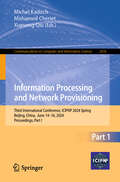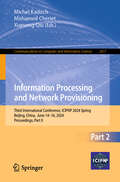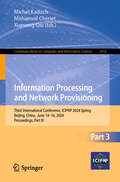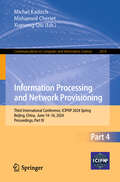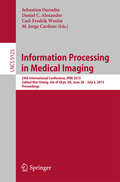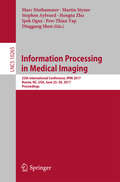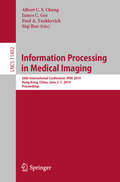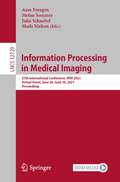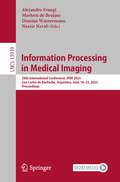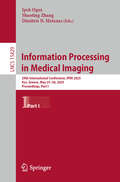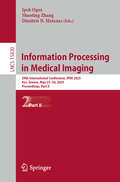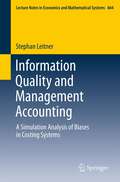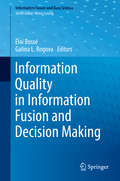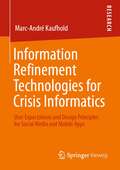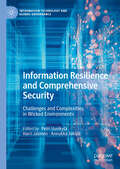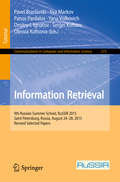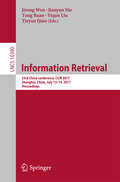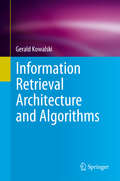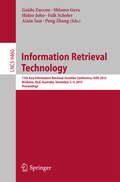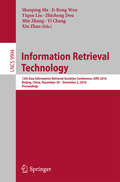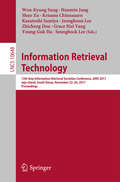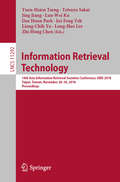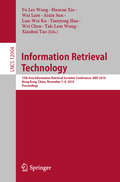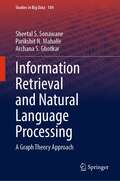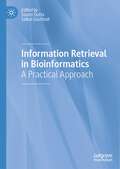- Table View
- List View
Information Processing and Network Provisioning: Third International Conference, ICIPNP 2024 Spring, Beijing, China, June 14–16, 2024, Proceedings, Part I (Communications in Computer and Information Science #2416)
by Xuesong Qiu Michel Kadoch Mohamed CherietThe four-volume set CCIS 2416, 2417, 2418 and 2419 constitutes the refereed post-conference proceedings of the Third International Conference on Information Processing and Network Provisioning, ICIPNP 2024 Spring, held in Beijing, China, during June 14–16, 2024. The 152 revised full papers presented in these proceedings were carefully reviewed and selected from 347 submissions. They focus on topics ranging from 5G/6G evolution and AI in network optimization to quantum communication and green computing.
Information Processing and Network Provisioning: Third International Conference, ICIPNP 2024 Spring, Beijing, China, June 14–16, 2024, Proceedings, Part II (Communications in Computer and Information Science #2417)
by Xuesong Qiu Michel Kadoch Mohamed CherietThe four-volume set CCIS 2416, 2417, 2418 and 2419 constitutes the refereed post-conference proceedings of the Third International Conference on Information Processing and Network Provisioning, ICIPNP 2024 Spring, held in Beijing, China, during June 14–16, 2024. The 152 revised full papers presented in these proceedings were carefully reviewed and selected from 347 submissions. They focus on topics ranging from 5G/6G evolution and AI in network optimization to quantum communication and green computing.
Information Processing and Network Provisioning: Third International Conference, ICIPNP 2024 Spring, Beijing, China, June 14–16, 2024, Proceedings, Part III (Communications in Computer and Information Science #2418)
by Xuesong Qiu Michel Kadoch Mohamed CherietThe four-volume set CCIS 2416, 2417, 2418 and 2419 constitutes the refereed post-conference proceedings of the Third International Conference on Information Processing and Network Provisioning, ICIPNP 2024 Spring, held in Beijing, China, during June 14–16, 2024. The 152 revised full papers presented in these proceedings were carefully reviewed and selected from 347 submissions. They focus on topics ranging from 5G/6G evolution and AI in network optimization to quantum communication and green computing.
Information Processing and Network Provisioning: Third International Conference, ICIPNP 2024 Spring, Beijing, China, June 14–16, 2024, Proceedings, Part IV (Communications in Computer and Information Science #2419)
by Xuesong Qiu Michel Kadoch Mohamed CherietThe four-volume set CCIS 2416, 2417, 2418 & 2419 constitutes the refereed post-conference proceedings of the Third International Conference on Information Processing and Network Provisioning, ICIPNP 2024 Spring, held in Beijing, China, during June 14–16, 2024. The 152 revised full papers presented in these proceedings were carefully reviewed and selected from 347 submissions. They focus on topics ranging from 5G/6G evolution and AI in network optimization to quantum communication and green computing.
Information Processing in Medical Imaging
by Daniel C. Alexander Carl-Fredrik Westin Sebastien Ourselin M. Jorge CardosoThis book constitutes the proceedings of the 24th International Conference on Information Processing in Medical Imaging, IPMI 2015, held at the Sabhal Mor Ostaig College on the Isle of Skye, Scotland, UK, in June/July 2015. The 22 full papers and 41 poster papers presented in this volume were carefully reviewed and selected from 195 submissions. They were organized in topical sections named: probabilistic graphical models; MRI reconstruction; clustering; statistical methods; longitudinal analysis; microstructure imaging; shape analysis; multi-atlas fusion; fast image registration; deformation models; and the poster session.
Information Processing in Medical Imaging: 25th International Conference, IPMI 2017, Boone, NC, USA, June 25-30, 2017, Proceedings (Lecture Notes in Computer Science #10265)
by Marc Niethammer, Martin Styner, Stephen Aylward, Hongtu Zhu, Ipek Oguz, Pew-Thian Yap and Dinggang ShenThis book constitutes the proceedings of the 25th International Conference on Information Processing in Medical Imaging, IPMI 2017, held at the Appalachian State University, Boon, NC, USA, in June 2017. The 53 full papers presented in this volume were carefully reviewed and selected from 147 submissions. They were organized in topical sections named: analysis on manifolds; shape analysis; disease diagnosis/progression; brain networks an connectivity; diffusion imaging; quantitative imaging; imaging genomics; image registration; segmentation; general image analysis.
Information Processing in Medical Imaging: 26th International Conference, IPMI 2019, Hong Kong, China, June 2–7, 2019, Proceedings (Lecture Notes in Computer Science #11492)
by James C. Gee Paul A. Yushkevich Siqi Bao Albert C. ChungThis book constitutes the proceedings of the 26th International Conference on Information Processing in Medical Imaging, IPMI 2019, held at the Hong Kong University of Science and Technology, Hong Kong, China, in June 2019. The 69 full papers presented in this volume were carefully reviewed and selected from 229 submissions. They were organized in topical sections on deep learning and segmentation; classification and inference; reconstruction; disease modeling; shape, registration; learning motion; functional imaging; and white matter imaging. The book also includes a number of post papers.
Information Processing in Medical Imaging: 27th International Conference, IPMI 2021, Virtual Event, June 28–June 30, 2021, Proceedings (Lecture Notes in Computer Science #12729)
by Aasa Feragen Mads Nielsen Stefan Sommer Julia SchnabelThis book constitutes the proceedings of the 27th International Conference on Information Processing in Medical Imaging, IPMI 2021, which was held online during June 28-30, 2021. The conference was originally planned to take place in Bornholm, Denmark, but changed to a virtual format due to the COVID-19 pandemic.The 59 full papers presented in this volume were carefully reviewed and selected from 200 submissions. They were organized in topical sections as follows: registration; causal models and interpretability; generative modelling; shape; brain connectivity; representation learning; segmentation; sequential modelling; learning with few or low quality labels; uncertainty quantification and generative modelling; and deep learning.
Information Processing in Medical Imaging: 28th International Conference, IPMI 2023, San Carlos de Bariloche, Argentina, June 18–23, 2023, Proceedings (Lecture Notes in Computer Science #13939)
by Alejandro Frangi Nassir Navab Marleen De Bruijne Demian WassermannThis book constitutes the proceedings of the 28th International Conference on Information Processing in Medical Imaging, IPMI 2023, which took place in San Carlos de Bariloche, Argentina, in June 2023.The 63 full papers presented in this volume were carefully reviewed and selected from 169 submissions. They were organized in topical sections as follows: biomarkers; brain connectomics; computer-aided diagnosis/surgery; domain adaptation; geometric deep learning; groupwise atlasing; harmonization; federated learning; image synthesis; image enhancement; multimodal learning; registration; segmentation; self supervised learning; surface analysis and segmentation.
Information Processing in Medical Imaging: 29th International Conference, IPMI 2025, Kos, Greece, May 25–30, 2025, Proceedings, Part I (Lecture Notes in Computer Science #15829)
by Shaoting Zhang Ipek Oguz Dimitris N. MetaxasThis two-volume set LNCS 15829-15830 constitutes the proceedings of the 29th International Conference on Information Processing in Medical Imaging, IPMI 2025, held on Kos, Greece, during May 25-30, 2025. The 51 full papers presented in this volume were carefully reviewed and selected from 143 submissions. They were organized in topical sections as follows: Part I: Classification/Detection; Registration; Reconstruction; Image synthesis; Image enhancement; and Segmentation.Part II: Computer-aided diagnosis/surgery; Brain; Diffusion models; Self-supervised learning; Vision-language models; Shape analysis; and Time-series image analysis.
Information Processing in Medical Imaging: 29th International Conference, IPMI 2025, Kos, Greece, May 25–30, 2025, Proceedings, Part II (Lecture Notes in Computer Science #15830)
by Shaoting Zhang Ipek Oguz Dimitris N. MetaxasThis two-volume set LNCS 15829-15830 constitutes the proceedings of the 29th International Conference on Information Processing in Medical Imaging, IPMI 2025, held on Kos, Greece, during May 25-30, 2025. The 51 full papers presented in this volume were carefully reviewed and selected from 143 submissions. They were organized in topical sections as follows: Part I: Classification/Detection; Registration; Reconstruction; Image synthesis; Image enhancement; and Segmentation.Part II: Computer-aided diagnosis/surgery; Brain; Diffusion models; Self-supervised learning; Vision-language models; Shape analysis; and Time-series image analysis.
Information Quality and Management Accounting: A Simulation Analysis of Biases in Costing Systems
by Stephan LeitnerOne of the main aims of management accounting is to provide managers with accurate information in order to provide a good basis for decision-making. There is evidence that the information provided by management accounting systems (MAS) is distorted and the occurrence of biases in accounting information is widely accepted among users of MAS. At the same time, the intensity and the frequency of use of MAS increase, too. Consequently, the quality of the provided information is critical. The focus of this simulation study is twofold. On the one hand, the impact of the sophistication of traditional costing systems on error propagation in the case of a set of input biases is investigated. On the other hand, the impact of single and multiple input biases on the quality of the information provided by traditional costing systems is focused. In order to investigate the research questions, a simulation approach is applied.
Information Quality in Information Fusion and Decision Making (Information Fusion and Data Science)
by Éloi Bossé Galina L. RogovaThis book presents a contemporary view of the role of information quality in information fusion and decision making, and provides a formal foundation and the implementation strategies required for dealing with insufficient information quality in building fusion systems for decision making. Information fusion is the process of gathering, processing, and combining large amounts of information from multiple and diverse sources, including physical sensors to human intelligence reports and social media. That data and information may be unreliable, of low fidelity, insufficient resolution, contradictory, fake and/or redundant. Sources may provide unverified reports obtained from other sources resulting in correlations and biases. The success of the fusion processing depends on how well knowledge produced by the processing chain represents reality, which in turn depends on how adequate data are, how good and adequate are the models used, and how accurate, appropriate or applicable prior and contextual knowledge is. <p><p> By offering contributions by leading experts, this book provides an unparalleled understanding of the problem of information quality in information fusion and decision-making for researchers and professionals in the field.
Information Refinement Technologies for Crisis Informatics: User Expectations and Design Principles for Social Media and Mobile Apps
by Marc-André KaufholdMarc-André Kaufhold explores user expectations and design implications for the utilization of new media in crisis management and response. He develops a novel framework for information refinement, which integrates the event, organisational, societal, and technological perspectives of crises. Therefore, he reviews the state of the art on crisis informatics and empirically examines the use, potentials and barriers of both social media and mobile apps. Based on these insights, he designs and evaluates ICT concepts and artifacts with the aim to overcome the issues of information overload and quality in large-scale crises, concluding with practical and theoretical implications for technology adaptation and design.
Information Resilience and Comprehensive Security: Challenges and Complexities in Wicked Environments (Information Technology and Global Governance)
by Petri Uusikylä Harri Jalonen Annukka JokipiiChanges in the global environment, the complexity of decision-making, and the new role of social media have challenged the operating models and practices of traditional crisis preparedness and security of supply. In a knowledge society context, securing the continuous flow of information and communication on different platforms is a huge challenge, and the role of information resilience is more crucial than ever. Bringing together leading specialists from many fields on information resilience, this book examines how to ensure the undisturbed flow of information, the functionality of information and communications networks, and reliable and secure information content in all circumstances, both from an individual and societal viewpoint. The book address issues around information resilience from the standpoint of management, national security, misinformation, social media, and commercial actors. It will appeal to scholars and students of public policy, disaster management, security studies and governance, as well as practitioners.
Information Retrieval
by Pavel Braslavski Ilya Markov Panos Pardalos Yana Volkovich Dmitry I. Ignatov Sergei Koltsov Olessia KoltsovaThis book constitutes the thoroughly refereed proceedings of the 9th Russian Summer School on Information Retrieval, RuSSIR 2015, held in Saint Petersburg, Russia, in August 2015. The volume includes 5 tutorial papers, summarizing lectures given at the event, and 6 revised papers from the school participants. The papers focus on various aspects of information retrieval.
Information Retrieval
by Tieyun Qian Yiqun Liu Tong Ruan Jirong Wen Jianyun NieThis book constitutes the refereed proceedings of the 23rd China Conference on Information Retrieval, CCIR 2017, held in Shanghai, China, in July 2017. The 21 full papers presented were carefully reviewed and selected from 41 submissions. The papers are organized in topical sections: recommendation; understanding users; NLP for IR; IR and applications; query processing and analysis.
Information Retrieval Architecture and Algorithms
by Gerald KowalskiThis text presents a theoretical and practical examination of the latest developments in Information Retrieval and their application to existing systems. By starting with a functional discussion of what is needed for an information system, the reader can grasp the scope of information retrieval problems and discover the tools to resolve them. The book takes a system approach to explore every functional processing step in a system from ingest of an item to be indexed to displaying results, showing how implementation decisions add to the information retrieval goal, and thus providing the user with the needed outcome, while minimizing their resources to obtain those results. The text stresses the current migration of information retrieval from just textual to multimedia, expounding upon multimedia search, retrieval and display, as well as classic and new textual techniques. It also introduces developments in hardware, and more importantly, search architectures, such as those introduced by Google, in order to approach scalability issues. About this textbook: A first course text for advanced level courses, providing a survey of information retrieval system theory and architecture, complete with challenging exercisesApproaches information retrieval from a practical systems view in order for the reader to grasp both scope and solutionsFeatures what is achievable using existing technologies and investigates what deficiencies warrant additional exploration
Information Retrieval Technology
by Peng Zhang Guido Zuccon Shlomo Geva Hideo Joho Falk Scholer Aixin SunThis book constitutes the refereed proceedings of the11th Information Retrieval Societies Conference, AIRS 2015, held in Brisbane,QLD, Australia, in December 2015. The 29 full papers presented together with 11 short anddemonstration papers, and the abstracts of 2 keynote lectures were carefullyreviewed and selected from 92 submissions. The final programme of AIRS 2015 isdivided in 10 tracks: Efficiency, Graphs, Knowledge Bases and Taxonomies,Recommendation, Twitter and Social Media, Web Search, Text Processing,Understanding and Categorization, Topics and Models, Clustering, Evaluation,and Social Media and Recommendation.
Information Retrieval Technology: 12th Asia Information Retrieval Societies Conference, AIRS 2016, Beijing, China, November 30 – December 2, 2016, Proceedings (Lecture Notes in Computer Science #9994)
by Shaoping Ma, Ji-Rong Wen, Yiqun Liu, Zhicheng Dou, Min Zhang, Yi Chang and Xin ZhaoThis book constitutes the refereed proceedings of the 12th Information Retrieval Societies Conference, AIRS 2016, held in Beijing, China, in November/December 2016. The 21 full papers presented together with 11 short papers were carefully reviewed and selected from 57 submissions. The final programme of AIRS 2015 is divided in the following tracks: IR models and theories; machine learning and data mining for IR; IR applications and user modeling; personalization and recommendation; and IR evaluation.
Information Retrieval Technology: 13th Asia Information Retrieval Societies Conference, AIRS 2017, Jeju Island, South Korea, November 22-24, 2017, Proceedings (Lecture Notes in Computer Science #10648)
by Won-Kyung Sung, Hanmin Jung, Shuo Xu, Krisana Chinnasarn, Kazutoshi Sumiya, Jeonghoon Lee, Zhicheng Dou, Grace Hui Yang, Young-Guk Ha and Seungbock LeeThis book constitutes the refereed proceedings of the 13th Information Retrieval Societies Conference, AIRS 2017, held in Jeju, Korea, in November 2017. The 17 full papers presented were carefully reviewed and selected from numerous submissions. The final program of AIRS 2017 is divided in the following tracks: IR Infrastructure and Systems; IR Models and Theories; Personalization and Recommendation; Data Mining for IR; and IR Evaluation.
Information Retrieval Technology: 14th Asia Information Retrieval Societies Conference, AIRS 2018, Taipei, Taiwan, November 28-30, 2018, Proceedings (Lecture Notes in Computer Science #11292)
by Tetsuya Sakai Jing Jiang Yuen-Hsien Tseng Lun-Wei Ku Dae Hoon Park Jui-Feng Yeh Liang-Chih Yu Lung-Hao Lee Zhi-Hong ChenThis book constitutes the refereed proceedings of the 14th Information Retrieval Societies Conference, AIRS 2018, held in Taipei, Taiwan, in November 2018.The 8 full papers presented together with 9 short papers and 3 session papers were carefully reviewed and selected from 41 submissions. The scope of the conference covers applications, systems, technologies and theory aspects of information retrieval in text, audio, image, video and multimedia data.
Information Retrieval Technology: 15th Asia Information Retrieval Societies Conference, AIRS 2019, Hong Kong, China, November 7–9, 2019, Proceedings (Lecture Notes in Computer Science #12004)
by Wei Chen Xiaohui Tao Fu Lee Wang Aixin Sun Haoran Xie Lun-Wei Ku Tianyong Hao Tak-Lam Wong Wai LamThis book constitutes the refereed proceedings of the 15th Information Retrieval Technology Conference, AIRS 2019, held in Hong Kong, China, in November 2019.The 14 full papers presented together with 3 short papers were carefully reviewed and selected from 27 submissions. The scope of the conference covers applications, systems, technologies and theory aspects of information retrieval in text, audio, image, video and multimedia data.
Information Retrieval and Natural Language Processing: A Graph Theory Approach (Studies in Big Data #104)
by Parikshit N. Mahalle Sheetal S. Sonawane Archana S. GhotkarThis book gives a comprehensive view of graph theory in informational retrieval (IR) and natural language processing(NLP). This book provides number of graph techniques for IR and NLP applications with examples. It also provides understanding of graph theory basics, graph algorithms and networks using graph. The book is divided into three parts and contains nine chapters. The first part gives graph theory basics and graph networks, and the second part provides basics of IR with graph-based information retrieval. The third part covers IR and NLP recent and emerging applications with case studies using graph theory. This book is unique in its way as it provides a strong foundation to a beginner in applying mathematical structure graph for IR and NLP applications. All technical details that include tools and technologies used for graph algorithms and implementation in Information Retrieval and Natural Language Processing with its future scope are explained in a clear and organized format.
Information Retrieval in Bioinformatics: A Practical Approach
by Soumi Dutta Saikat GochhaitThe book presents the results of studies on selected problems (such as predictive model of transcription initiation and termination, protein recognition codes, protein structure prediction, feature selection for disease prediction, information retrieval from medical imaging) of Bioinformatics and Information Retrieval. Information Retrieval is one of the contemporary answers to new challenges in threat evaluation of composite systems. This book provides a practical course in computational data analysis suitable for students or researchers with no previous exposure to computer programming. It describes in detail the theoretical basis for statistical analysis techniques used throughout the textbook, from basic principles. It presents walk-throughs of data analysis tasks using different tools to help in taking decisions in healthcare management.
